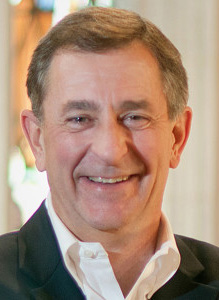One of the biggest challenges facing congregations in pastoral transition is realizing how radically the search process has changed since the turn of the century, according to Bill Wilson, founder of the Center for Healthy Churches.
He and his successor, Matt Cook, spoke during a Sept. 20 webinar hosted by Baptist News Global and moderated by BNG Executive Director Mark Wingfield. The 75-minute conversation primarily focused on leadership transitions in churches and nonprofits.
“It’s a different world in the 21st century,” Wilson said. “In fact, we are now in the third decade of the 21st century, which is new to a lot of churches that haven’t realized the (pastoral search) model has dramatically shifted.”
Many churches have not had any experience with a pastor search process in the new climate, which is itself a good sign, Wilson noted, explaining churches that have frequent experiences with pastor searches have another kind of problem.
Why search committees make mistakes
Wingfield, who is a former associate pastor in a large Baptist church and a veteran Baptist journalist, asked why leadership teams and search committees so frequently fail in calling pastors who are healthy fits for their communities.

Matt Cook
One reason is that the entire process is so much more complicated than it was the last time many congregations were looking for new pastors, Cook said, citing one particular church he recently worked with.
“We had a lot of centripetal forces in the 20th century that have become centrifugal forces in the 21st century. So, for the first time in decades, they were asking a set of questions they had not asked in a long time, and the last time they asked them, it was a completely different context. Part of the reason churches struggle is because the world has placed so many more variables into the process than it used to.”
Wilson cited several other factors, including the collapse of denominational support that churches once relied upon during transitions, resulting in all manner of individualized approaches.
“Many of the things they think they know, they don’t really know.”
“Many congregations are having to act on their own and they often look to corporate models,” he said. “There are often HR people from the bank or the university on the search committee who know best. They buy a book, or they read an article. So, a lot of it feels foreign to them and many of the things they think they know, they don’t really know. They don’t understand the life of ministry, the life of congregational polity and that sort of thing.”
Wilson said he has seen transitions bring out the worst in lay members.
“Some people have been waiting a long time to ‘fix our church’ and ‘by God, I’m going to get on that committee and I’m going to get it. We’re going to get it right this time,’” he said. “And you get these single-issue folks. If we don’t get in early enough to help them select the search team, it’s almost like the footer gets crooked and the house will never be plumb.”
Search committees should not underestimate the difficulties facing ministers in the current environment and how they can complicate a transition, he added. “The pressures on clergy, even on a good day, are painful in our divided communities and our broken political system. Bonding with a candidate who can make everyone happy is almost an impossible task.”
Also challenging is the marked decline in pastoral candidates being produced by seminaries and fewer still that have a love for serving the church. “The supply chain is really bad, really broken. You look and there aren’t that many people out there.”
Congregational size
Wingfield asked what’s different about leadership transitions among churches of different sizes.

Bill Wilson
“Large churches are used to trusting a small group of people to do the heavy lifting, but the larger you go, the more pressure that comes along with that getting it right,” Cook noted.
Pastors hired at the largest churches may struggle to build relationships and trust in their new congregations than their counterparts in small and medium churches, he added. “In the larger systems, you know you have to hit the ground running, you have to preach well from day one, you have to lead well from day one, and then the relationships kind of catch up.”
Even megachurches, with all their resources, are susceptible to flawed pastoral transitions, Cook added. “I haven’t been able to find one that I know that just went really, really well.”
“It becomes very difficult to step in behind them and be anything other than a disappointment because the church embodies so much of that person.”
A major hurdle often arises for churches attempting to replace a charismatic or founding pastor, Wilson said. “When some of the startup churches take on so much of the personality of the founder or the charismatic pastoral leader, it becomes very difficult to step in behind them and be anything other than a disappointment because the church embodies so much of that person.”
The same pattern occurs regularly outside the church, in business and sports when popular leaders depart, he explained. “There are all sorts of stories about succeeding an extremely successful leader and somehow coming up short. Part of this is our expectation and our proclivity for idolizing pastoral leaders in a way that’s not fair to their successors.”
The secret is process
The secret sauce in pastoral transitions begins long before a candidate is presented to the church, Wilson said. “A healthy process is the best predictor of success for the succeeding pastor. The old model was, ‘Let’s put out an ad, call the seminaries, wait for our denominational body to send us a packet of resumes, and we’ll pick one.’ There was never any kind of self-study to ask, ‘Who are we? What’s our DNA without a pastor? What’s our context and how has it changed?’”
Without such examination, there is “no chance” a church will find a candidate capable of leading a congregation into the next decade, he said. “That’s what we are constantly saying to our churches: You’re calling for the 2030s, not the 1990s, and you have to adapt your expectations and your profile to fit that.”
EQ, SQ and MQ
Wingfield asked why some pastor search committees seem to lose their minds and make terrible decisions anyone outside the church could see is wrong.
Sometime this happens when committee members push pre-existing agendas through the process, Wilson said. “Honestly, it’s a lack of spiritual humility, a lack of willingness to say, ‘We need help, we actually need divine intervention.’ They tend to be Type A personalities and they kind of have a feeling that ‘We got this.’ There is a lack of spiritual discernment, a willingness to engage in honest-to-God prayer.”
Another culprit is the tendency to over-value the “pulpit presence” of candidates, he said. “Committees often think what they see in the pulpit is what they’re going to get. But we all know preaching is one day a week and the other six days of the week are where you make or break your success as a pastor.”
Clients of the Center for Healthy Churches are instead urged to consider the emotional intelligence, or EQ, of a candidate, which is “a key predictor of success in any vocational field and certainly in ministry,” Wilson said. “And we’ve added SQ, spiritual maturity: Do they actually embody the fruit of the spirit? And MQ or missional intelligence: Do they know how to pastor or lead in the 21st century going forward rather than 21st century going backward?”
“The best interviewer does not equal the best pastor.”
Search committees also often err by placing too much emphasis on the quality of resumes and interviewing skills of candidates, Cook added. “The best interviewer does not equal the best pastor. That is something we have to wean people off of a little bit.”
Another common trap is relying on a list of traits to judge candidates, he said. “When the church starts to disagree about what the qualitative measures might be, that’s when tensions start to exist and conflict can start to arise.”
Don’t limit to only ‘senior pastors’
Yet another mistake is narrowing pastor searches to candidates with “senior pastor” experience, Wilson said. Doing so overlooks the emotional, spiritual and missional intelligence an associate, children’s or youth pastor may have in favor of someone who has resume status but not the gifts and graces needed.
“Learn about their heart, their soul, their mind and not just assume that because someone has that particular degree or particular experience that that somehow conveys a superior ability to lead than someone else,” he advised.
Requiring “senior pastor” experience also presents a barrier to women being considered for pastorates where they might be the best candidates, both Cook and Wilson said.
These days, churches need to understand they are no longer alone in the driver’s seat when it comes to pastoral transition, Cook said. “Our model is predicated on the process being a two-way street. Both candidates and committees have agency in this process. We tell search committees they can’t sit back with a list of questions like you’re the hand of God judging and critiquing these people.”
That approach also requires committees to be forthcoming about the challenges facing the church, he said. “If the goal is long-term success, hiding that information doesn’t do anybody any good. Candidates ought to know where all the major lumps in the oatmeal are.”
Underlying all this, the traditional pipeline of pastors from seminaries to churches is greatly reduced, Cook said. Although total seminary enrollment may not be down, “The number of people at (seminaries) who want to go into congregational ministry is significantly on the decline relative to what it was a generation ago.”
That means churches have fewer candidates to choose from. “The challenge that creates for churches is that the old tried and true methods of finding people to take on those roles have largely broken down. So, you’re having to be very creative in terms of how many people we talk to and where those people are.”
Attitudes among candidates are also different, Wilson said. “You’re talking to people who have a mild interest in your congregation. They’re not applying for the job and we say to (committees) all the time: Do not assume these people are ready to move to your town. They are curious enough to talk to you.”
Female and male candidates
One webinar participant asked if any of these trends or challenges are different depending on whether the transition is from a male to a female pastor, or from a female to another female.
Both Cook and Wilson said female and male pastors face many of the same questions and challenges, but the biggest barrier remains getting churches to agree up front to give women equal consideration and not to make excuses for not considering female candidates.
“One of the silver linings to the death of Christendom is it’s going to create more opportunities for women,” Cook said. “It’s not happening as fast as we’d like it in Baptist life, but it is happening.”
Congregations open to women as pastors will find their candidate pools bigger than other churches, he said. If a church says, “OK, we’re open to associates and we’re a church that supports women,” then “all of a sudden their candidate pool can expand easily without having to have a big fight about it.”
Watch the entire webinar here.


